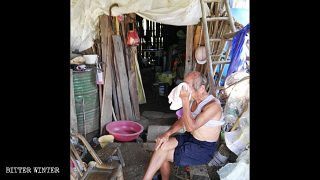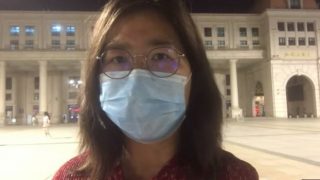Greek law enforcement officers at the land border with Turkey in the northeastern Evros region routinely summarily return asylum seekers and migrants.
(Athens) – Greek law enforcement officers at the land border with Turkey in the northeastern Evros region routinely summarily return asylum seekers and migrants, Human Rights Watch said today. The officers in some cases use violence and often confiscate and destroy the migrants’ belongings.
“People who have not committed a crime are detained, beaten, and thrown out of Greece without any consideration for their rights or safety,” said Todor Gardos, Europe researcher at Human Rights Watch. “The Greek authorities should immediately investigate the repeated allegations of illegal pushbacks.”
Human Rights Watch interviewed 26 asylum seekers and other migrants in Greece in May, and in October and November in Turkey. They are from Afghanistan, Iraq, Morocco, Pakistan, Syria, Tunisia, and Yemen, and include families traveling with children. They described 24 incidents of pushbacks across the Evros River from Greece to Turkey.
Most incidents took place between April and November. All of those interviewed reported hostile or violent behavior by Greek police and unidentified forces wearing uniforms and masks without recognizable insignia. Twelve said police or these unidentified forces accompanying the police stripped them of their possessions, including their money and personal identification, which were often destroyed. Seven said police or unidentified forces took their clothes or shoes and forced them back to Turkey in their underwear, sometimes at night in freezing temperatures.
Abuse included beatings with hands and batons, kicking, and, in one case, the use of what appeared to be a stun gun. In another case, a Moroccan man said a masked man dragged him by his hair, forced him to kneel on the ground, held a knife to his throat, and subjected him to a mock execution. Others pushed back include a pregnant 19-year-old woman from Afrin, Syria, and a woman from Afghanistan who said Greek authorities took away her two young children’s shoes.
Increasing numbers of migrants, including asylum seekers, have attempted to cross the Evros River, which forms a natural border between Greece and Turkey, since April. By the end of September, the International Organization for Migration (IOM) had registered 13,784 arrivals by land, a nearly fourfold increase over the same period last year.
In early June, Turkey unilaterally suspended all returns under a bilateral readmission agreement, stopping coordinated returns over the land border. In a July letter to Human Rights Watch, Hellenic Police Director Georgios Kossioris acknowledged an “acute problem” related to new arrivals and migrants arrested in the region, causing the overcrowding in some facilities, and inhumane conditions in police stations and registration and identification centers Human Rights Watch had documented.
Accounts gathered by Human Rights Watch are consistent with the findings of other nongovernmental groups, intergovernmental agencies, and media reports. UNHCR, the United Nations Refugee Agency, has raised similar concerns. In a June report, the Council of Europe’s (CoE) Committee for the Prevention of Torture said it has received “several consistent and credible allegations of pushbacks by boat from Greece to Turkey at the Evros River border by masked Greek police and border guards or (para-)military commandos.” In November, the CoE human rights commissioner called on Greece to investigate allegations, in light of information pointing to “an established practice.”
Human Rights Watch wrote to the head of border protection of the Hellenic Police on December 6, 2018, informing them of its findings. In his reply, Police Director Kossioris categorically denied that Hellenic Police carry out forced summary returns. He said all procedures for the detention and identification of migrants entering Greece were carried out in line with relevant legislation, and that they “thoroughly investigate” any incidents of misconduct or violation of migrants’ and asylum seekers’ rights. Greek authorities have consistently denied pushback practices, including a high-ranking Greek police official in a June meeting with Human Rights Watch. For a decade, Human Rights Watch has documented systematic pushbacks by Greek law enforcement officials at its land border with Turkey.
Greek authorities should promptly investigate in a transparent, thorough, and impartial manner repeated allegations that Greek police and border guards are involved in collective and extrajudicial expulsions at the Evros region. Authorities should investigate allegations of violence and excessive use of force. Any officer engaged in such illegal acts, as well as their commanding officers, should be subject to disciplinary sanction and, as appropriate, criminal prosecution. Anyone seeking international protection should have the opportunity to apply for asylum, and returns should follow a procedure that provides access to effective remedies and safeguards against refoulement – return to a country where they are likely to face persecution, and ill-treatment.
The European Commission, which provides financial support to the Greek government for migration control, including in the Evros region, should urge Greece to end all summary returns of asylum seekers to Turkey, press the authorities to investigate allegations of violence, and open legal proceedings against Greece for violating European Union laws.
“Despite government denials, it appears that Greece is intentionally, and with complete impunity, closing the door on many people who seek to reach the European Union through the Evros border,” Gardos said. “Greece should cease forced summary returns immediately and treat everyone with dignity and respect for their basic rights.”
For detailed accounts from asylum seekers and migrants, please see below. Please note that all names have been changed.
Human Rights Watch interviewed 26 people from Afghanistan, Iraq, Morocco, Pakistan, Syria, Tunisia, and Yemen, including seven women, two of whom were pregnant at the time they were summarily returned to Turkey across the Evros River. In seven cases, families were pushed back, including children.
In Greece, Human Rights Watch interviewed people who managed to re-enter Greek territory following a pushback, in the Fylakio pre-removal detention center and in the Fylakio reception and identification center, as well as in the Diavata camp for asylum seekers in Thessaloniki. In Turkey, those interviewed were in the Edirne removal center and in urban locations in Istanbul.
All names of interviewees have been changed to protect their privacy and security. Interviews were carried out privately and confidentially, in the interviewees’ first language, or a language they spoke fluently, through interpreters. Interviewees shared their accounts voluntarily, and without remuneration, and have consented to Human Rights Watch collecting and publishing their accounts.
Pushbacks in Evros
The 24 incidents described demonstrate a pattern that points to an established and well-coordinated practice of pushbacks. Most of the incidents share three key features: initial capture by local police patrols, detention in police stations or informal locations close to the border with Turkey, and handover from identifiable law enforcement bodies to unidentifiable paramilitaries who would carry out the pushback to Turkey across the Evros River, at times violently. In nine cases, migrants said uniformed police physically mistreated them before or during the pushback.
The accounts suggest close and consistent coordination between police with unidentified, often masked, men who may or may not be law enforcement officers. In a May interview with Human Rights Watch, Second Lieutenant Sofia Lazopoulou at the border police station of Neo Cheimonio said that police officers wearing dark blue uniforms were in charge of services at the police station and that those who wear military camouflage uniforms were patrolling officers, in charge of prevention and deterrence of irregular migrants crossing into Greece.
Interviewees said that people who looked like police officers or soldiers, as well as some of the unidentified masked men, carried equipment such as handguns, handcuffs, radios, spray cans, and batons, while others carried tactical gear such as armored gloves, binoculars, and knives and military grade weapons, such as rifles.
The repeated nature of the pushbacks and the fact that those officers who conduct them were clearly on official duty, indicates that commanding officers knew, or ought to have known, what was happening.
Ferhat G., a Syrian Kurdish man in his forties, said two police officers detained him, his wife, and three children, ages 12, 15, and 19, at an abandoned train station on September 19. They were held in a large caged area in the backyard of a police station with dozens of other people for five hours. Ferhat could not say where the train station or police station were:
We were all put in a van, 60 to 70 people. Commandos all in black, wearing face masks, drove us back to the river. We were very afraid… I saw other people there, mainly youths with just shorts, no other clothes. Our blood froze out of fear. When they opened the van, we started going out. “Stand in one line, one-by-one,” they said and hit someone. Ten by 10, they put us in a small boat, driven by a Greek soldier. I cried because of the humiliation.
The modus operandi was largely replicated, with some variations, in the other cases Human Rights Watch documented.
Capture
Twenty-one of those interviewed said local police patrols detained them in towns and villages near the border or in open farmland. Two said that the police took them off a bus or a train shortly after its departure. Three said they could not identify the men who detained them and took them directly back to the border. People said they were then transported in police cars, pick-up trucks, white vans without windows or signs, or larger trucks painted in green or camouflage that appeared to be military trucks.
Karim L., 25, from Morocco, said that police officers removed him from a train to Alexandropouli on November 8. Shortly after its scheduled departure from Orestiada, at 12:37 p.m., police officers began asking passengers who looked foreign to show their passports and took Karim and five or six others off the train. The police took him to a nearby police station and kept him there for two nights. Then four men wearing police uniforms and black masks took him to the border in a van. He said they subjected him to physical violence and a mock execution, then pushed him back to Turkey. He was not photographed, fingerprinted, or given any paper to read or sign, or otherwise informed of the reasons for his arrest. He said that other people, including families with children, were also detained in the station’s three cells.
Mahsa N., an Afghan woman, said uniformed police officers removed her, her husband, their three children, ages 5, 9, and 11, and two unrelated Afghan men from a bus 15 minutes after it left Alexandropouli in mid-September, during their third attempt to enter Greece. They were pushed back to Turkey the same day, with the police who had detained them taking them all the way to the Evros River, where others were already being held so they could be returned on a boat.
Dila E., a 25-year-old Syrian woman, described her experience shortly after crossing the Evros River in late April. She said she was with seven other people, including four children, when masked men she could not identify pushed them back to Turkey as they were walking in a small town near the border:
They came with a car and took us. They put us in a white van. You couldn’t see anything from the inside. They took us directly to the river and made us cross the river with a rubber boat. They took everyone’s mobile phones, set of clothes, and even the money from some.
Malik N., a 26-year-old Moroccan man, said uniformed police stopped him along with three other men on November 13 near a gas station in Didymoteicho, a town two kilometers from the border. He said that one of the policemen made a phone call, and a white van arrived 15 minutes later. Two men he could not identify took him and two of his group to a location that he described as barracks: “They put us in the car, which was very well made, dark inside, and without seats. There were no signs on it. … There was a terrible smell [in the barracks], and officials had their masks on… There were 30 people there.”
Masked men took him to the border the next evening:
After the masked people came, they started to shout at us, and hit us one by one with batons at the door. There were around eight people outside the barracks, each with a thick plastic baton. They would hit you as you walked to the car. They would shout “Fuck Islam.” They put 30 of us in the van. [There were] no chairs. I felt like I was suffocating, there was no air. When we arrived at the river, they ordered people to strip to shorts only. They took my phones, my money, €1,500, and my glasses, and broke them.
Sardar T., 18, from Afghanistan, said that uniformed police caught him and the group of people he was traveling with at the Didymoteicho bus station on April 23. He said the police came with a white van but later brought a big car, similar to a military truck with green camouflage. Human Rights Watch researchers saw a vehicle matching Sardar’s description parked in the yard of the border police station of Neo Cheimonio, as well as numerous white vans, without police signs. Sardar said that the officers who pushed them back to Turkey were wearing police uniforms and that masks concealed their faces except for their eyes.
Detention
Thirteen of those interviewed reported that they were detained in formal and informal locations close to the border, for periods ranging from a few hours to five days. Five said they were taken to a police station, while eight described buildings on the outskirts of nearby villages and towns, or on farmland that they said were used as drop-off points for detained migrants. None of the interviewees, even those held at police stations, were duly identified and registered, and their detention appears to have been arbitrary and incommunicado.
A few dozen to one hundred people were detained at a time, without food, water, and sanitation, and then taken to the Evros River and returned to Turkey. Interviewees described the rooms in the unidentified buildings as “prison-like” and “like a storage room,” with a few mattresses and a single, filthy toilet. They said women and families with children were either held together with unrelated men, or sometimes in adjacent rooms.
Mahsa, the Afghan woman who was summarily returned to Turkey three times, said she and her family were kept for five days, along with unrelated men who were also detained, in a dark room with no beds or heat before the second pushback, in late August. They were not given any food. Their belongings, including winter coats for her young children, and a cherished backpack and doll, were never returned. Up to 10 guards, wearing belts with what appeared to be handguns, batons, and pepper spray, would check on people and lock the door but not provide any information. She saw guards beating men staying in the same room: “They had a blue uniform with writing on it in Greek on the back, with big letters. They called us dirt.”
Azadeh B., a 22-year-old Afghan woman traveling with her husband and two children, ages 2 and 4, said they were pushed back twice from Greece – and had spent five days in detention before being returned the second time, in early October. She said they were taken to a room in a structure located in the middle of farmland:
We could not see or hear anything. We were not asked to sign anything or told anything. The guards closed the door and locked it. When families asked for water, they filled dirty bottles and threw them inside the room through the door. They took everything from us, even the Quran. We asked them to give back our kids’ shoes, but they didn’t. They do this because they don’t want us to come back. If it’s something of value, they keep it, something they don’t like, they put it in the bin.
She said only the children were given some biscuits while detained in a room that was about 40 square meters and shared by about 80 people whom she believed were also all migrants.
Hassan I., a Tunisian man in his thirties, said that before being violently pushed back along with four friends in early August, they spent a day in detention. He said the location resembled a military base because they saw military vehicles, including trucks and tanks, parked near the room in which they were held. It was a 15-minute drive from the town of Orestiada, where they had been stopped and picked up in the morning by two police officers in blue uniforms in a civilian car.
The policemen drove them to the location, where guards violently pushed them against a wall, searched them, and hit them. “First, they asked for phones, then for money,” Hassan said. They were shouting ‘malaka’ [a Greek insult meaning ‘asshole’]. I was shocked. I felt humiliated. When we tried to ask for anything, like our sim cards, memory cards, they hit us immediately.” Hassan and his friends were put in a room that looked like a storage room. In an adjacent room, they could hear the voices of families with children. Hassan estimated that by 9 p.m., when they were taken to the border in trucks, about 80 men were in his room of about 24 square meters, in which there were only a few chairs, a toilet, and a water tap.
Zara Z., 19 and four-months pregnant, from Afrin, Syria, said that in mid-May, men wearing camouflage uniforms stopped her and her husband and detained them overnight in a room without bedding or furniture, together with other migrant families, and without any food or water. The next day they were transferred in a van to the Evros River, put on a boat, and pushed back to Turkey.
Pushbacks across the Evros River
All those interviewed said they were transported to the border with Turkey in groups of 60 to 80, in military trucks or unmarked vans. In all but three cases, the agents wore face masks, black pants, or camouflage, making it impossible to recognize or identify them. In the three other cases, interviewees said police in regular blue and camouflage uniforms transported them to the river. Ten out of 26 interviewees said they were physically abused or witnessed others being ill-treated during the pushback operation.
Karim, a 25-year-old Moroccan man, said Greek police handed him over to masked men wearing police uniforms after they caught him in Greece on November 10 and that he was violently pushed back to Turkey. After ordering him to take off his clothes and shoes, two of the masked officers kicked him to the ground and hit him with a baton, then one of them subjected him to a mock execution. They dragged him by his hair and forced him to kneel on the ground, while the masked officer held a knife to his throat and said in broken English, “Whoever returns to Greece, they will die.” Karim said he could not sleep at night and was experiencing recurrent nightmares.
Hassan, the Tunisian who was pushed back with his four friends on August 10 or 11, said that masked men wearing black clothes ill-treated them after taking them to the border in a truck. One of the men used a stun gun on Hassan’s lower back, causing burns that were still visible over two months later. He provided video footage of the group’s injuries, which he said was recorded the day after the incident and was first posted on social media on August 12, showing several bruises he said resulted from blows to their upper and lower backs and limbs. “Next time I will see you,” one of the masked men told him in English, “I will kill you.” At the time of the interview, Hassan had been sleeping in parks in Istanbul, after all his belongings were confiscated in Greece.
Amir B., a Tunisian man in his twenties, was pushed back to Turkey at the end of September after entering Greece and hiding for six days. He said he was returned from near Alexandropouli to the border in one of two military trucks, which together took around 80 people to the border, including about 30 women and a few children. Amir said masked men pushed people around as they got off the trucks, and then pushed them toward the river, ordering them to remain silent. The agents then split the group into smaller groups of 10 and ordered them to take off their shoes. Women had to give up their coats, while some men had to strip to underwear. Amir’s jeans, where he also kept his money, were set on fire. When a black pick-up truck arrived with a small boat, the guards checked the other side of the river with binoculars, and then used the small boat to take the groups of 10 in turn across the water.
Human Rights Watch.Greece: Violent Pushbacks at Turkey Border. © 2018 by Human Rights Watch.



